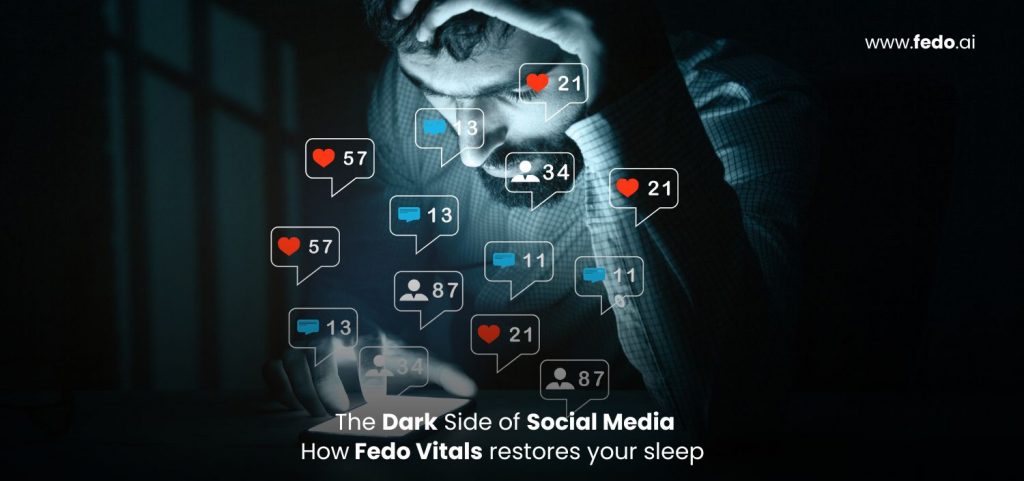
In today’s fast-paced digital world, it’s common for people to unwind by scrolling through their favorite social media platforms before bed. Yet, this seemingly harmless habit may be silently wreaking havoc on your sleep quality. Recent studies have revealed a troubling connection between pre-sleep screen time and increased sleep disturbances, including nightmares. In this blog, we’ll delve into the dark side of this modern phenomenon and introduce Fedo Vitals as a beacon of hope for reclaiming peaceful, restorative sleep.
The Silent Intruder: How Screen Time Affects Your Sleep
Every night, millions of people turn to their screens to catch up on the latest updates, completely unaware of the potential consequences. The impact of screen time on sleep quality can be profound, affecting both the mind and body in several key ways:
1. Blue Light Exposure: The pervasive blue light emitted from screens can interfere with the production of melatonin, the hormone responsible for regulating sleep. This disruption delays the onset of sleep and diminishes its overall quality.
2. Emotional Overload: The constant barrage of information—ranging from distressing news to personal conflicts—can trigger emotional responses that linger into the night, leading to restlessness and disturbed sleep.
3. Fear of Missing Out (FOMO): The endless stream of updates and notifications fosters a fear of missing out on important events or trends, creating anxiety that can make it difficult to relax and fall asleep.
4. Increased Anxiety and Depression: Studies have consistently linked excessive screen time to higher levels of anxiety and depression. These mental health issues further disrupt sleep patterns and elevate the likelihood of experiencing nightmares.
The Nightmare Connection
One of the most alarming aspects of this issue is the correlation between screen time and nightmares. Research indicates that individuals who spend more time on their devices are more prone to experiencing nightmares. These distressing dreams often involve scenarios mirroring the emotional turmoil and stress experienced during the day. The resulting emotional distress can perpetuate a cycle of poor sleep and heightened anxiety.
The Continuity Hypothesis of Dreaming
The continuity hypothesis of dreaming suggests that our dreams are reflections of our waking life experiences. Therefore, if we are constantly exposed to negative or stressful content before bed, it’s no surprise that these experiences manifest in our dreams. This hypothesis underscores the necessity of managing screen time, particularly before bedtime, to improve sleep quality.
Practical Steps to Improve Sleep
1. Set Boundaries: Establish a “digital curfew” by turning off devices at least an hour before bedtime. This allows your body to produce melatonin and prepare for sleep.
2. Create a Relaxing Routine: Engage in calming activities such as reading a book, taking a warm bath, or practicing mindfulness meditation to wind down before bed.
3. Limit Exposure to Distressing Content: Be mindful of the type of content you consume, especially in the evening. Avoid engaging in heated debates or consuming distressing news close to bedtime.
4. Use Blue Light Filters: Many devices offer blue light filters that can reduce the impact of screen light on your sleep. Make use of these features, especially in the evening.
Stress and Its Impact on Sleep
Beyond the immediate effects on sleep, the stress generated by screen time has broader implications for overall health. Elevated stress levels contribute to high blood pressure, heart disease, and a myriad of other health issues. It’s crucial to recognize and address this stress to maintain both mental and physical well-being.
Introducing Fedo Vitals: Your Path to Restful Sleep
Imagine a world where, instead of scrolling through your social media feed before bed, you check your health insights in a gamified, engaging way. This is where Fedo Vitals comes in.
Fedo Vitals leverages cutting-edge AI to analyze your vital signs and health data, offering personalized insights into your sleep patterns and overall well-being. With a simple 14-second face scan, Fedo Vitals can identify stress levels, predict health risks, and provide tailored recommendations to enhance your sleep quality. By understanding your stress levels, you can take proactive steps to manage your health, including controlling blood pressure and reducing anxiety.
Incorporating Fedo Vitals into your night routine not only provides valuable health insights but also transforms your pre-sleep ritual into a productive, health-focused activity. This shift can help you mitigate the negative effects of screen time, allowing you to reclaim restful, uninterrupted sleep.
In conclusion, while the digital age offers unparalleled connectivity and convenience, it’s essential to be aware of its potential impact on our sleep and health. By setting boundaries, adopting healthier pre-sleep habits, and utilizing innovative solutions like Fedo Vitals, you can protect your sleep and enhance your overall quality of life.
Ready to end restless nights and embrace better sleep? Explore how Fedo Vitals can help you manage stress and enhance your well-being. Reach out at hello@fedo.ai to get started on your journey to restful nights.